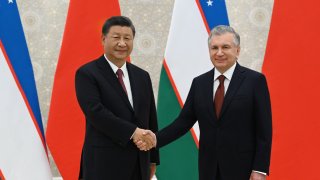VIDEO: The China-Central Asia Crossroads
The Chinese and Central Asian peoples have interacted for more than two millennia; Russia, by contrast, has only been active in the region for the last two centuries.
Since gaining independence in 1991, the Central Asian states have again forged steadily growing ties with China. These ties advanced significantly in 2013 when Xi Jinping formally announced the Silk Road Economic Belt—part of the Belt and Road Initiative—in Kazakhstan. China's expanding presence in the region, however, has raised new concerns among neighboring countries over economic, political, and cultural sovereignty. In light of Xi Jinping’s recent visit to the Shanghai Cooperation Organization's annual meeting in Astana and an official visit to Tajikistan, three experts will review the evolving dynamics of these relationships.
On July 25, the Center for the National Interest hosted the fifth in a monthly series of expert discussions organized by the Center’s Central Asia Connectivity Project.
—Elizabeth Wishnick is a Senior Research Scientist in the China and Indo-Pacific Security Affairs Division at the Center for Naval Analyses (CNA) and a Senior Research Scholar at the Weatherhead East Asian Institute at Columbia University. She was a tenured professor of Political Science at Montclair State University from 2005-2024. Dr. Wishnick has dual regional expertise on China and Russia and is an expert on Chinese foreign policy, Sino-Russian relations, Northeast Asian and Central Asian security, and Arctic geopolitics. She received a PhD in Political Science from Columbia University, an MA in Russian and East European Studies from Yale University, and a BA from Barnard College. She speaks Mandarin, Russian, and French.
—Brian Carlson is Research Professor of Indo-Pacific Security Studies at the China Landpower Studies Center of the Strategic Studies Institute at the U.S. Army War College. Previously, he served as head of the global security team at the Center for Security Studies at ETH Zürich and, prior to that, as a postdoctoral fellow and researcher at RAND Corporation. Dr. Carlson holds a PhD in International Relations from the Johns Hopkins School of Advanced International Studies (SAIS). His research focuses primarily on China-Russia relations. He speaks Chinese and Russian.
—Temur Umarov is a Fellow at the Carnegie Russia Eurasia Center, specializing in Central Asian countries’ domestic and foreign policies, as well as China’s relations with Russia and Central Asian neighbors. A native of Uzbekistan, Umarov holds degrees in China studies and international relations from the Russian Presidential Academy of National Economy and Public Administration and the Moscow State Institute of International Relations (MGIMO). He holds an MA in world economics from the University of International Business and Economics (Beijing). He speaks Chinese, Russian, Tajik, and Uzbek.
Andrew Kuchins, Senior Fellow at the Center for the National Interest, moderated the discussion.
Image: Khikmatilla Ubaydullaev / Shutterstock.com.

